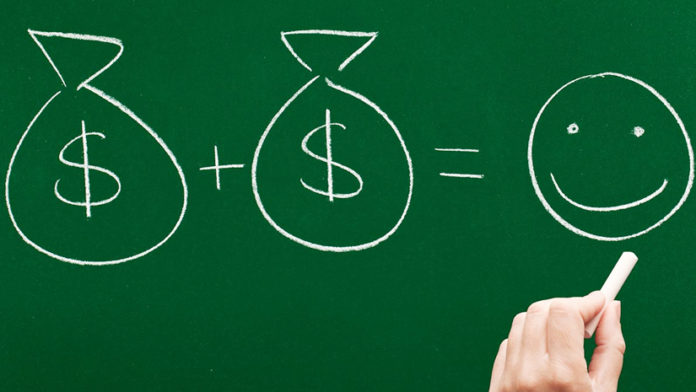If you made a diagram of American life since the finish of World War II, each line concerning cash and the things that cash can purchase would take off upward, a measurable landmark to realism. Expansion balanced pay per American has nearly tripled. The measure of the regular new house has dramatically increased. A two-auto carport was previously an objective; now we’re almost a three-auto country.Creator everything, individual hardware and different things that didn’t exist a half-century prior are currently reasonable. Regardless of how you outline the patterns in winning and spending, everything is up, up, up. Be that as it may, in the event that you made an outline of American satisfaction since the finish of World War II, the lines would be as level as a marble tabletop. In surveys taken by the National Opinion Research Center in the 1950s, around 33% of Americans depicted themselves as “exceptionally glad.” The inside has gathered information intermittently from that point forward, and the rate remains the very same today.
 Yet if you listed out reason of depression since 1950, the lines suggest a growing drastically. Contingent upon what presumptions are utilized, clinical depression is 3 to 10 times as normal today than two eras prior. A late review by Ronald Kessler of Harvard Medical School assessed that every year, 1 in 15 Americans encounter a scene of real gloom – significance not only an awful day but rather wretchedness so weakening that it’s difficult to get up. Cash clatters in our wallets and handbags as at no other time, however we are fundamentally no more joyful for it, and for some, more cash prompts to depression. In what manner can that be?
Yet if you listed out reason of depression since 1950, the lines suggest a growing drastically. Contingent upon what presumptions are utilized, clinical depression is 3 to 10 times as normal today than two eras prior. A late review by Ronald Kessler of Harvard Medical School assessed that every year, 1 in 15 Americans encounter a scene of real gloom – significance not only an awful day but rather wretchedness so weakening that it’s difficult to get up. Cash clatters in our wallets and handbags as at no other time, however we are fundamentally no more joyful for it, and for some, more cash prompts to depression. In what manner can that be?
Of course, our grandmothers, many of whom lived through the Depression and the war, told us that money can’t buy happiness. We don’t act as though we listened. Millions of us spend more time and energy pursuing the things money can buy than engaging in activities that create real fulfillment in life, like cultivating friendships, helping others and developing a spiritual sense.
 We say we know that money can’t buy happiness. In the TIME poll, when people were asked about their major source of happiness, money ranked 14th. Still, we behave as though happiness is one wave of a credit card away. Too many Americans view expensive purchases as “shortcuts to well-being,” says Martin Seligman, a psychologist at the University of Pennsylvania. But people are poor predictors of where those shortcuts will take them.
We say we know that money can’t buy happiness. In the TIME poll, when people were asked about their major source of happiness, money ranked 14th. Still, we behave as though happiness is one wave of a credit card away. Too many Americans view expensive purchases as “shortcuts to well-being,” says Martin Seligman, a psychologist at the University of Pennsylvania. But people are poor predictors of where those shortcuts will take them.
To be sure, there is ample evidence that being poor causes unhappiness. Studies by Ruut Veenhoven,a sociologist at Erasmus University in Rotterdam, show that the poor–those in Europe.
Standards of living, education levels and other basic measures of U.S. social well-being have improved so much so quickly in the postwar era. If the new house is typically more than 2,300 sq. ft., if more than half of high school graduates advance to college, if there are more cars and trucks in the U.S. than there are licensed drivers–all current statistics–then the country may need stability and equality more than it needs more money. But because we are all conditioned to think there’s something wrong if we don’t make more money each year, high standards of living in the U.S. may, paradoxically, have become an impediment to happiness. Fixated on always getting more, we fail to appreciate how much we have. Of course, in the grand scheme it’s better that there are large numbers of Americans who are materially comfortable, if a bit whiny about it, than who are destitute. And never forget: 1 in 8 Americans are poor. Poverty remains a stark reality amid American affluence.
 Such important statistics clearly shows up the face of the psychology,the actual human activity. It mentioned at last that money which is having a predominant role over human happiness.By connecting this Want to conclude that financial crisis after WW2 took a wild role on changing the concept and mindset about money.
Such important statistics clearly shows up the face of the psychology,the actual human activity. It mentioned at last that money which is having a predominant role over human happiness.By connecting this Want to conclude that financial crisis after WW2 took a wild role on changing the concept and mindset about money.
Brain science and human science aside, there is a last reason cash can’t purchase satisfaction: the things that truly matter in life are not sold in stores. Cherish, companionship, family, regard, a place in the group, the conviction that your life has reason – those are the basics of human satisfaction, and they can’t be obtained with money. Everybody needs a specific measure of cash, yet pursuing cash as opposed to importance is a recipe for discontent. An excessive number of Americans have made realism and the cycle of work and spend their key objectives. At that point they ask why they don’t feel happy.
By NB.




























